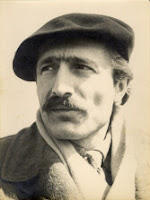Benim, ben.
Öyle bir ben ki gelen kapına;
Başdan - başa sen.
( SEN Sen Sen )
2 =1
Who is it, don't ask needlessly..
It's I, it's me.
Yet a me who comes to your door;
You entirely.
( THOU Thou Thou )
Ozdemir Asaf
TELAŞ
Yaşamak değil,
Beni bu telaş öldürecek.
RUSH
Not living,
This rushing will kill me.
Sana gitme demeyeceğim.
Üşüyorsun ceketimi al.
Günün en güzel saatleri bunlar.
Yanımda kal.
Sana gitme demeyeceğim.
Gene de sen bilirsin.
Yalanlar istiyorsan yalanlar söyleyeyim,
İncinirsin.
Sana gitme demeyeceğim,
Ama gitme, Lavinia.
Adını gizleyecegim
Sen de bilme, Lavinia.
I shall not ask you not to go.
You're cold, take my coat.
These are the loveliest hours of the day.
Stay at my side.
I shall not ask you not to go.
Still, you know best.
Lies if you wish, lies I shall tell.
Your feelings would be hurt.
I shall not ask you not to go,
But do not go Lavinia.
I shall keep your name..
You too, don't know, Lavinia.
BİYOGRAFİ
Özdemir Asaf
11 Haziran 1923'te Ankara'da doğdu. 28 Ocak 1981'de İstanbul'da öldü. Asıl adı Halit Özdemir Arun'dur. İlk ve ortaöğreniminin bir bölümünü Galatasaray Lisesi'nde yaptı. 1942 yılında Kabataş Erkek Lisesi'nden mezun oldu. İstanbul Üniversitesi'nde, önce Hukuk Fakültesi'ne, sonra İktisat Fakültesi ve Gazetecilik Enstitüsü'ne devam ettiyse de 1947'de yüksek öğrenimini yarıda bıraktı. Bir süre sigorta prodüktörlüğü yaptı. 'Zaman' ve 'Tanin' gazetelerinde çevirmen olarak çalıştı. İlk yazısı 1939'da 'Servetifünun-Uyanış' dergisinde çıktı. 1951'de Sanat Basımevi'ni kurarak matbaacılık yaşamına girdi. Kendi şiir kitaplarını bastı. 1955'te Yuvarlak Masa Yayınları'nı kurdu.
İkilikler ve dörtlüklerden oluşan ilk şiirlerinde yoğun bir söyleyiş özelliği göze çarpar. İnsan toplum ilişkilerine yönelik temaları konu edinerek düşündürücü bir şiir evreni kurmuştur. Duygu ve düşünce yoğunluğuyla birlikte, alay ve taşlama şiirine egemen olan öğelerdir. İnsan ilişkilerinin toplumsal ve bireysel yanlarını sen ben ikileminde vermiştir. Çok kullandığı sevgi, ayrılık, ölüm temaları, son dönem şiirlerinde giderek yerini kaçış ve umutsuzluğun tedirginliğine bırakmıştır.
Şiirin bir görüşü yansıtması, bir iletisinin olması düşüncesinden yola çıkmıştır. Yuvarlağın Köşeleri kitabında şiirin ve yazarın işlevi konusundaki görüşlerini dile getirmiştir. Batı şiiri ve geleneksel Türk şiirinden yararlanarak verdiği bileşim sanatını zenginleştirip geliştirmiştir.
Kitapları:
Şiir:
Dünya Kaçtı Gözüme (1955),
Sen Sen Sen (1956)
Bir Kapı Önünde (1957)
Yumuşaklıklar Değil (1962)
Nasılsın (1970)
Çiçekleri Yemeyin (1975)
Yalnızlık Paylaşılmaz (1978)
Benden Sonra Mutluluk (ölümünden sonra 1984)
Etika:
Yuvarlağın Köşeleri (1961)
Yuvarlağın Köşeleri - 2 (ö.s. 1986)
Öykü:
Otokopi, deneme:
Özdemir Asaf'ça (ö.s. 1988)
Çeviri:
Oscar Wilde-Reading Zindanı Baladı (1968)
Özdemir Asaf is one of the most prominent figures of contemporary
Turkish Literature. His real name is Halit Özdemir Arun.
He was born in Ankara on June, 11th 1923. He died in
Istanbul on January 28th 1981. His father, Mehmet
Asaf, was a member of the Council of State. He lost his father in
1930. That year they moved to Istanbul. His mother sent him to
Galatasaray Lyceum, which is a school that teaches in French. At that
school famous literary men taught the Turkish Literature. And the
French Literature was taught by Frenchmen.
It was there that he began to be interested in literature.
He has studied Law at the Istanbul University for two years and
attended the Faculty of Economics for three years. He was always more
interested in theoretical subjects.
For a few years he worked as a journalist and in 1951 he set up his
own printing house.
His poetry and his translations from French poets and writers have
been published in journals and anthologies since 1940.
At the lyceum, for twelve years he was a boarder. Maybe this is one of
the reasons why he likes travelling so much. In 1954 he has traveled
to the Eastern Coast of U.S.A. and Cuba. In 1959 he has made an
extensive trip in Europe.
He has a habit of never publishing his work immediately after it has
been written. This postponement is not to improve on what he has
written. He does not wish the personal ups and downs to reflect in
poetry. For poetry he has a loftier fate in mind. Shelley said that
the poets are " the unacknowledged legislators of the
world. " For the poet concentrates on what truly matters to man,
to all men and in all time. And there must be a certain spark, a
certain germ in what he says to make it contagious.
For Özdemir Asaf every man is sensitive and wise. Yet not at the
same moment. Therefore he does not tie poetry only to the feelings or
only to the mind. Neither does he divide it in between the two. For
him checked feelings and emotional reasoning are the same in their
worthlessness. Man gains noting from them. He first takes man in
hand. First and foremost where man could come to or where he has come
and stayed. This is what is most important. Anyway, this is what man
wishes to find out first. Poetry must be directed towards this. The
why and how of his coming and staying there belong to the novel.
Poetry, throughout history has either praised or condemned man. If it
has done so it has done it with this outlook. In this way poetry has
glorified man which is the essence of its theme. And itself too.
His use of the Turkish language helps the stimulation in his form and
content, in that he achieves great field of expression with very few
words.
Özdemir Asaf's form is as condensed as his content.


